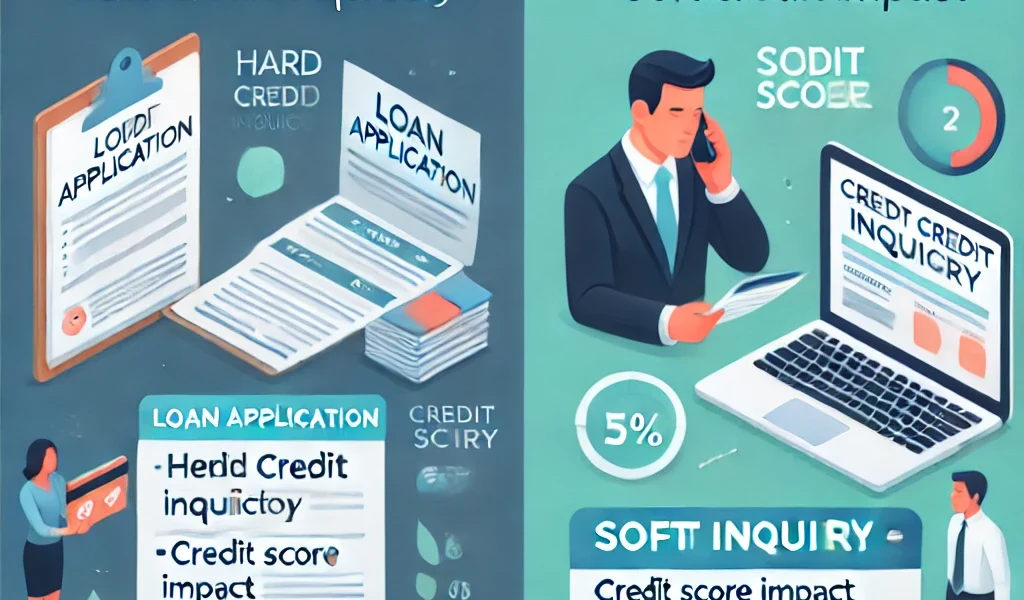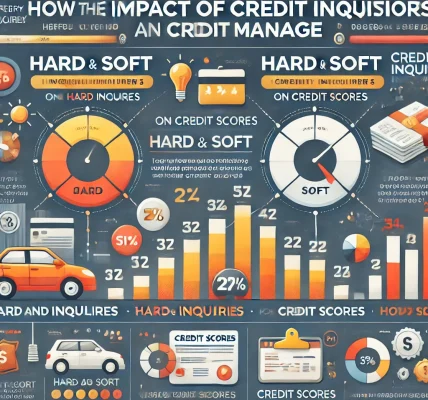Your credit score plays a crucial role in your financial health, affecting everything from loan approvals to interest rates. However, many people don’t realize that different types of credit inquiries—hard and soft—can impact their credit score differently. This guide will help you understand the difference between hard and soft inquiries, how they impact your credit, and how you can manage them effectively.
What Are Credit Inquiries?
A credit inquiry occurs when a lender, creditor, or other entity requests access to your credit report from one of the three major credit bureaus (Equifax, Experian, and TransUnion). These inquiries help lenders assess your financial reliability before offering credit or loans.
Credit inquiries are divided into two categories:
- Hard Credit Inquiries
- Soft Credit Inquiries
What Is a Hard Credit Inquiry?
A hard inquiry (or hard pull) happens when a lender or financial institution checks your credit as part of the decision-making process for a new credit account. This type of inquiry can impact your credit score and remains on your credit report for up to two years.
When Do Hard Inquiries Happen?
Hard inquiries occur when you:
- Apply for a credit card
- Apply for a mortgage loan
- Apply for an auto loan
- Request a personal loan
- Apply for a student loan
- Seek approval for new utility services or a rental agreement
How Hard Inquiries Affect Your Credit Score
- Temporary Credit Score Drop: A hard inquiry can lower your score by 5 to 10 points, depending on your credit history.
- Multiple Hard Inquiries Can Be Risky: Too many inquiries in a short period signal financial distress, making lenders hesitant to approve loans.
- Rate Shopping Exception: If you are shopping for a mortgage, auto loan, or student loan, multiple inquiries within a short timeframe (usually 14 to 45 days) may be counted as one inquiry to avoid penalizing rate shopping.
What Is a Soft Credit Inquiry?
A soft inquiry (or soft pull) happens when your credit report is checked for non-lending purposes. Soft inquiries do not impact your credit score and are typically used for pre-approval offers, background checks, or personal monitoring.
When Do Soft Inquiries Happen?
Soft inquiries occur when:
- You check your own credit score
- A credit card issuer or lender offers you a pre-approved credit offer
- An employer runs a background check as part of the hiring process
- A utility company verifies your identity
- A landlord checks your credit history before approving your rental application
How Soft Inquiries Affect Your Credit Score
Soft inquiries have no impact on your credit score. Since they do not indicate an attempt to borrow money, credit bureaus do not consider them when calculating your score.
How to Manage Credit Inquiries Effectively
To maintain a healthy credit score, it’s important to manage both hard and soft inquiries wisely. Here’s how:
1. Limit Unnecessary Hard Inquiries
- Only apply for credit when absolutely necessary.
- Research and compare lenders before submitting an application.
- Avoid applying for multiple credit cards in a short period.
2. Take Advantage of Pre-Approved Offers
- Check if you qualify for pre-approved credit offers before applying.
- Many lenders offer prequalification tools that perform soft inquiries without affecting your credit.
3. Monitor Your Credit Regularly
- Use services like Experian, Equifax, or TransUnion to monitor your credit.
- Identify and dispute any unauthorized hard inquiries.
4. Understand Rate Shopping Rules
- When shopping for loans (mortgage, auto, or student loans), complete applications within 14 to 45 days so multiple inquiries count as one.
5. Check Your Credit Report for Errors
- Request a free annual credit report at AnnualCreditReport.com.
- If you find incorrect hard inquiries, dispute them with the credit bureau.
Frequently Asked Questions About Credit Inquiries
Q1: How long do credit inquiries stay on my credit report?
- Hard inquiries remain on your credit report for up to 2 years, but their impact fades after 12 months.
- Soft inquiries do not appear on reports visible to lenders.
Q2: Can multiple hard inquiries ruin my credit score?
- A few inquiries won’t cause significant harm, but multiple inquiries in a short period can lower your score and make lenders view you as risky.
Q3: Will checking my own credit score hurt my credit?
- No! Checking your own credit report is a soft inquiry and does not affect your score.
Q4: How many points does a hard inquiry lower my credit score?
- A single hard inquiry can lower your score by 5-10 points, but the impact varies based on your overall credit profile.
Q5: Can I remove a hard inquiry from my credit report?
- If a hard inquiry was made without your authorization, you can dispute it with the credit bureaus.
Final Thoughts
Understanding the difference between hard and soft inquiries is essential for maintaining a strong credit score. While hard inquiries are necessary for obtaining credit, they should be managed carefully to prevent unnecessary damage to your financial profile.
Key Takeaways:
✅ Hard inquiries affect your credit score, while soft inquiries do not. ✅ Avoid unnecessary hard inquiries to protect your credit. ✅ Use pre-approvals and rate shopping strategies to minimize the impact of inquiries. ✅ Regularly monitor your credit report for accuracy.




